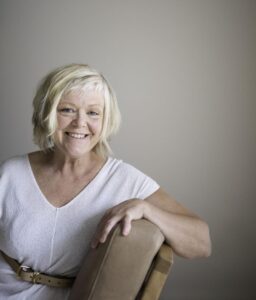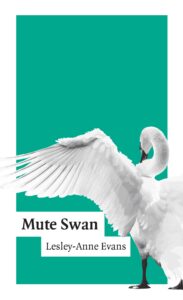
Lesley-Anne Evans, an Irish-Canadian poet, writes from and stewards Feeny Wood, a contemplative Christian woodland retreat in Kelowna, B.C., on the traditional territory of the Syilx Okanagan Nation. Her periodical publications include The Antigonish Review, Cascadia Review, Contemporary Verse 2, Faith Today, and Presence Journal. She helped found Red Couch, an art gallery for marginalized artists, and co-created SEE:kelowna, a museum exhibit sharing stories of homelessness. Mute Swan is her first collection of poems.

Mute Swan explores the landscape of the voiceless—voices misnamed, silenced, discounted, or subverted. Within a context of historic and contemporary Christendom, yet blurring perceptions of both, the poet offers a story of spiritual awakening and “unmuting.” Through her willingness to look directly at our human experience of injustice, impermanence, longing, beauty and love, the poet writes a way toward spiritual freedom. Mute Swan is a love letter calling us home.
“These are powerful, sometimes harrowing testimonies, woven together in fresh, often keenly beautiful poetry. A brave, original, memorable collection.” Malcolm Guite, Cambridge Univ.
“Like the ‘Mute Swan’ of the title, the poet participates in both contemplative silences and song, becoming at last ‘unmuted,’ fiercely present, committed to justice-making as well as to the mysteries of being to which words gesture and point.” Susan McCaslin, Langley, B.C.
“…earthy, raw prayers and rich birthing imagery, inviting the reader to plunge into the gorgeous messiness of life. These are poems where everything belongs.” Christine Valters Paintner, Galway, Ireland.
“The poems collected in Mute Swan don’t just remind us that ‘everything is holy,’ but the act of reading moves me to touch that experience for myself…a story beckoning me to a supper table where even the most rejected, fearsome and lonely parts can know home.” Gareth Higgins, Asheville, N.C.
$20 + postage
REVIEW by Diane Tucker
“The Natural Calls Forth the Supernatural: A Reflection on Mute Swan by Lesley-Anne Evans”
Woman raised in sexist, moralistic, “Christian” subculture rejects it but embraces a recontextualized faith later in life: it’s not a new story, but it’s certainly expressed with meticulous brilliance in Lesley-Anne Evan’s vivid, highly evocative spiritual memoir in poems.
We begin with the poet as a preschooler. She encounters the intoxicating sensuousness of a garden and a fresh tomato, a complete physical experience with “no shame.” It’s a glorious picture of the direct, filterless experience of a child’s senses.
Our heroine is plucked unceremoniously from this Edenic state to be raised in a bodiless, emotionless, legalistic religion that produces nothing, we are told, but “rage and exhaustion / in being good”. Our heroine is a human body expected to experience the world and God while disregarding that very body. As she grows up, she discovers this impossible situation, and “waking to this truth / is an unhinged oyster, / coyote’s quiver/at the threshold of a gate.”
The divine being experienced in adulthood by the poet is addressed as the Beloved in a sweet, new-romance tone with uncloying tenderness, as in “when moon is Love’s wafer / on the outstretched tongue / of night.”
Later she connects profoundly with Mary, of course, the human body that bore the incarnate body of God into the physical world and to many represents the Divine Feminine.
So the poet begins to embrace a physical life, know her body and the created world, find joy in somatic experiences. All feels realer, of course, than the empty legalism of her childhood.
As she abandons herself to this life of the senses, she meets her “Beloved”: God’s presence in created things: “Beloved, now that I am blank/ I am surfacing.”
This moment seems a letting go, an abandonment of striving, to see what will arise on its own to be received. It’s an intriguing recasting of Jesus’ statement: “Very truly I tell you, unless a kernel of wheat falls to the ground and dies, it remains only a single seed. But if it dies, it produces many seeds.” (John 12:24) As she says to the mute swan of the title, “You may feel as if you are dying but you will live…”
All of this is expressed in crisp and quietly intense poems that keep one reading. The manuscript as a whole might have packed a more consistent punch if it were shorter; the inclusion of a number of overheard conversations seems more like distraction to this reader and might have been better served in another manuscript, for example.
But life is messy, no? Our soul’s growth happens in the welter of life – jobs and grocery store trips and small talk. Perhaps I should find it hopeful that such spiritual learning and literary quality has flowered in life’s mess and hasn’t seemed to require some unearthly calling.
That’s an encouragement to listen even more deeply to Lesley-Anne Evans’ compelling poetic voice, the many lovely textures and notes intoned by her Mute Swan.
